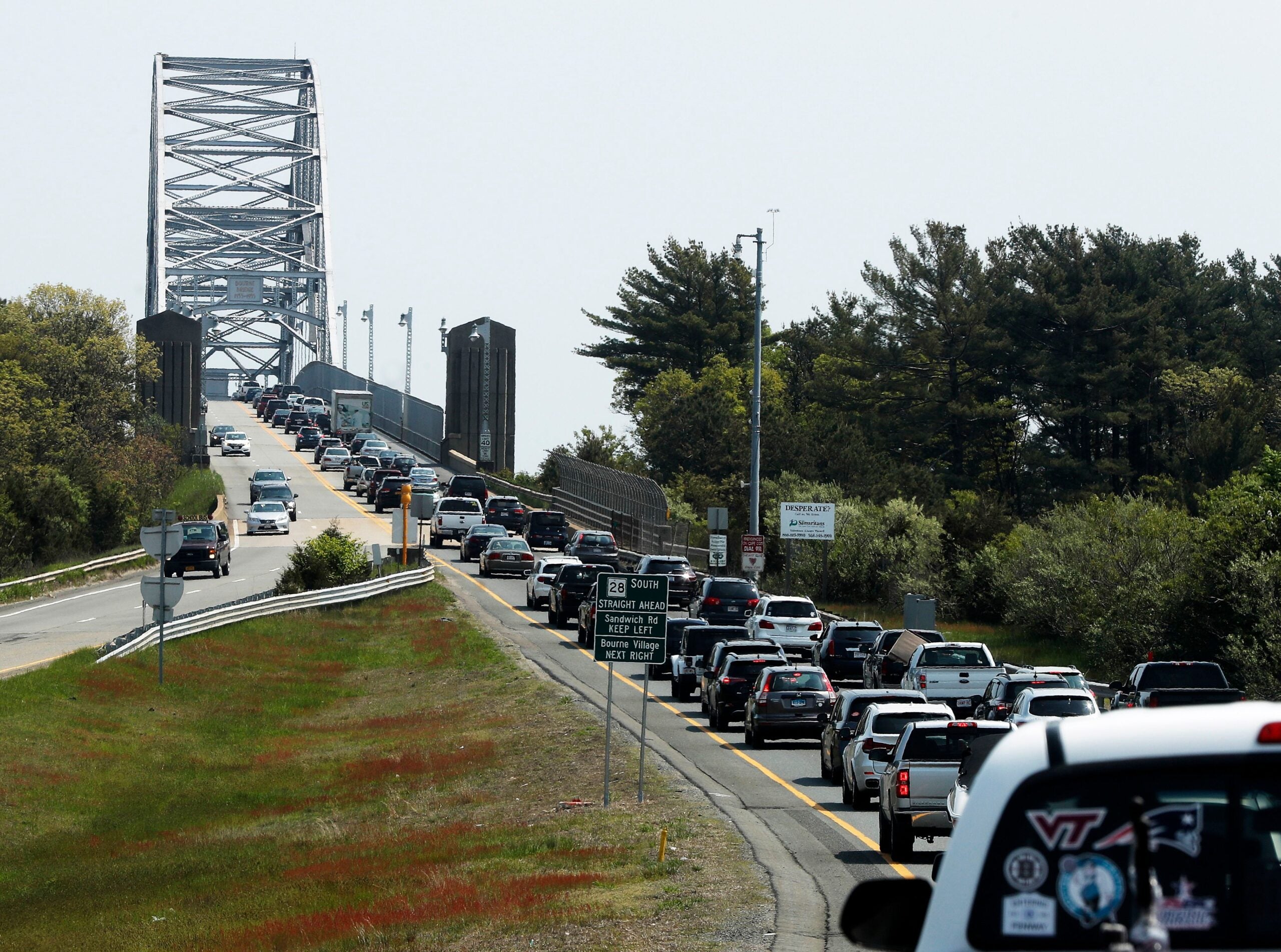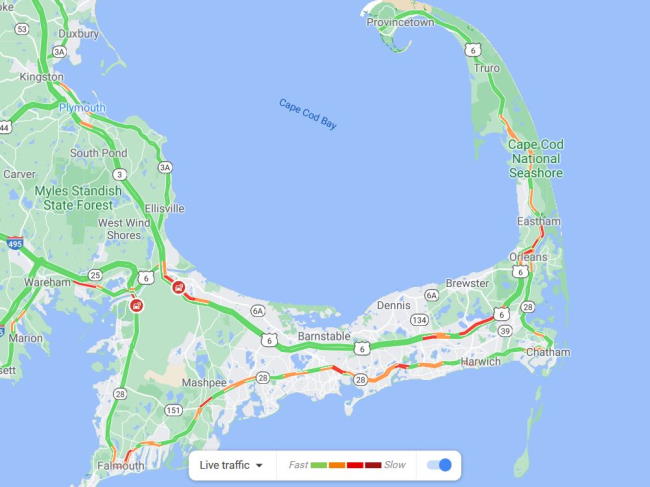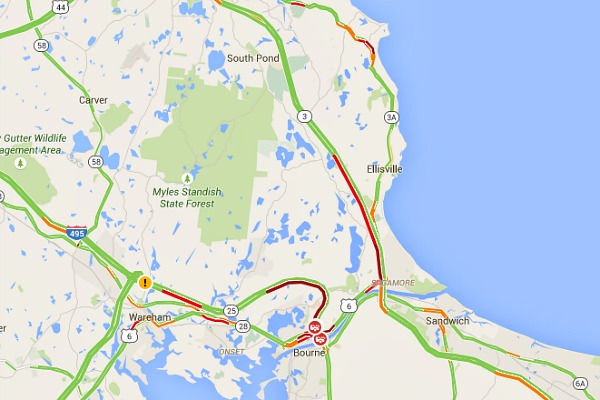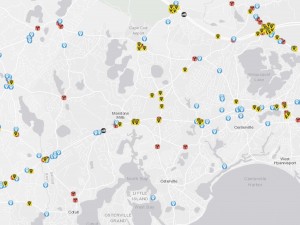Navigating the Cape Cod Traffic Maze: A Comprehensive Guide to Understanding and Utilizing Traffic Maps
Related Articles: Navigating the Cape Cod Traffic Maze: A Comprehensive Guide to Understanding and Utilizing Traffic Maps
Introduction
In this auspicious occasion, we are delighted to delve into the intriguing topic related to Navigating the Cape Cod Traffic Maze: A Comprehensive Guide to Understanding and Utilizing Traffic Maps. Let’s weave interesting information and offer fresh perspectives to the readers.
Table of Content
Navigating the Cape Cod Traffic Maze: A Comprehensive Guide to Understanding and Utilizing Traffic Maps

Cape Cod, a picturesque peninsula known for its charming towns, pristine beaches, and vibrant summer atmosphere, also presents a unique challenge for travelers: traffic. The influx of visitors during peak seasons creates congestion on its roadways, making navigating this beautiful destination a complex endeavor. Fortunately, the advent of traffic maps has revolutionized the way travelers approach Cape Cod’s traffic, offering invaluable insights and tools for a smoother journey.
Understanding the Traffic Dynamics of Cape Cod
Cape Cod’s traffic patterns are heavily influenced by several factors:
- Seasonality: Traffic volume fluctuates significantly throughout the year. The peak season, spanning from Memorial Day to Labor Day, witnesses a surge in visitors, leading to heavy congestion, particularly on weekends and holidays.
- Weekends and Holidays: Even during the off-season, weekends and holidays see increased traffic flow, as local residents and day-trippers flock to the peninsula’s attractions.
- Specific Routes: Certain roads, like Route 6, the main artery connecting the Cape’s major towns, are notorious for their traffic congestion, especially during peak hours.
- Weather: Adverse weather conditions, such as rain or snow, can exacerbate traffic delays, as reduced visibility and slippery roads impact driving speeds.
The Power of Traffic Maps
Traffic maps, available through various online platforms and mobile applications, provide real-time traffic information, helping travelers make informed decisions and avoid potential delays. These maps offer a range of features:
- Real-Time Traffic Data: Displaying current traffic conditions, including speed limits, congestion levels, and incidents, such as accidents or road closures.
- Route Planning: Suggesting optimal routes based on real-time traffic data, minimizing travel time and avoiding congested areas.
- Estimated Travel Time: Providing accurate estimates of travel time for specific routes, allowing travelers to plan their journeys effectively.
- Incident Reports: Alerting users to accidents, road closures, and other incidents that may impact their travel plans.
- Historical Traffic Data: Providing insights into past traffic patterns, allowing travelers to anticipate potential congestion during specific times or events.
Benefits of Using Traffic Maps for Cape Cod Travel
Utilizing traffic maps offers numerous benefits for travelers:
- Reduced Travel Time: By avoiding congested areas and choosing optimal routes, traffic maps can significantly reduce travel time, allowing travelers to maximize their time on Cape Cod.
- Stress Reduction: Knowing about potential delays and having alternative routes planned can minimize stress and anxiety associated with traffic congestion.
- Increased Safety: By being aware of road closures, accidents, and other hazards, traffic maps can contribute to a safer driving experience.
- Enhanced Trip Planning: With real-time traffic information, travelers can adjust their itineraries, ensuring they arrive at their destinations on time and avoid missing out on planned activities.
- Improved Flexibility: Traffic maps empower travelers to make informed decisions, allowing them to adapt their plans based on changing traffic conditions and explore alternative routes or destinations.
Key Considerations for Effective Traffic Map Usage
To make the most of traffic maps, consider these factors:
- Choose Reliable Sources: Utilize reputable platforms and apps known for their accuracy and real-time data updates.
- Check Traffic Conditions Regularly: Review traffic maps frequently, especially during peak travel times, to stay informed about changing conditions.
- Plan Alternative Routes: Have backup routes in mind, particularly during peak season or when encountering unexpected delays.
- Be Flexible with Your Itinerary: Adjust your schedule and consider alternative activities or destinations if traffic conditions necessitate it.
- Avoid Peak Travel Times: If possible, plan your trips outside of peak hours, such as early mornings, late evenings, or weekdays, to minimize traffic congestion.
FAQs about Traffic Maps for Cape Cod
Q: Which traffic map apps are best for Cape Cod?
A: Popular traffic map apps like Google Maps, Waze, and Apple Maps provide accurate real-time traffic data for Cape Cod.
Q: How accurate are traffic maps for Cape Cod?
A: The accuracy of traffic maps depends on various factors, including the app’s data sources, the time of day, and the location on Cape Cod. However, reputable apps generally offer reliable information.
Q: Can traffic maps help me avoid tolls on Cape Cod?
A: While some traffic map apps can identify toll roads, they may not always provide alternative routes that avoid tolls. Check the app’s features and settings to see if toll avoidance is available.
Q: Are traffic maps useful for navigating Cape Cod during the off-season?
A: Even during the off-season, traffic maps can be helpful for navigating Cape Cod, especially during weekends and holidays. They can help identify potential congestion points and suggest optimal routes.
Q: What are some alternative ways to avoid traffic on Cape Cod?
A: Consider using public transportation, biking, or walking, especially in areas with pedestrian-friendly infrastructure.
Tips for Navigating Cape Cod Traffic
- Plan your trip in advance: Research potential routes, consider alternative destinations, and check for traffic conditions before embarking on your journey.
- Leave early: If traveling during peak season, allow extra time for travel, especially on weekends and holidays.
- Be patient: Traffic congestion is inevitable on Cape Cod, especially during peak season. Accept the delays and focus on enjoying the journey.
- Stay informed: Monitor traffic conditions regularly through traffic maps or local news sources.
- Consider alternative modes of transportation: Explore public transportation, bike rentals, or walking as viable options, especially in popular tourist areas.
Conclusion
Navigating Cape Cod’s traffic can be challenging, but with the aid of traffic maps, travelers can mitigate delays and enjoy a smoother journey. By utilizing real-time traffic information, planning alternative routes, and being flexible with their itineraries, travelers can make the most of their Cape Cod experience, embracing its natural beauty and vibrant atmosphere without being overwhelmed by traffic congestion.







Closure
Thus, we hope this article has provided valuable insights into Navigating the Cape Cod Traffic Maze: A Comprehensive Guide to Understanding and Utilizing Traffic Maps. We appreciate your attention to our article. See you in our next article!